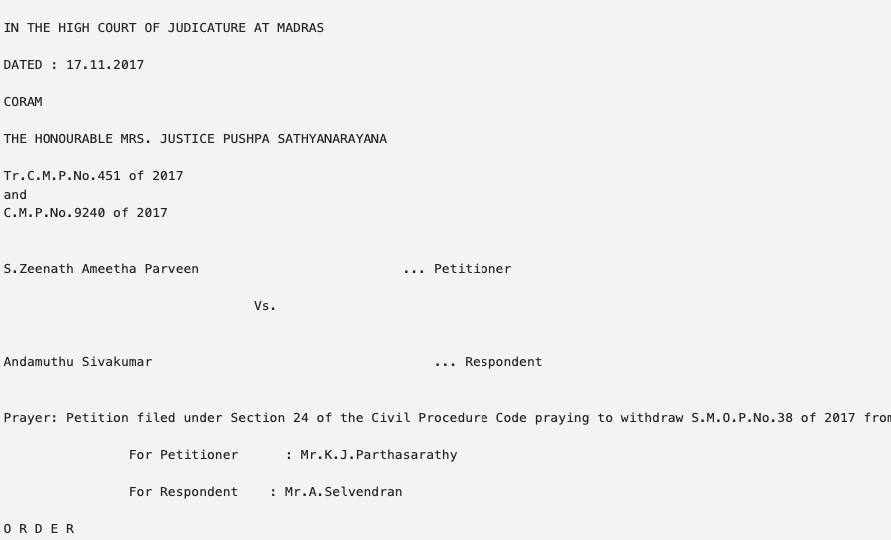Introduction: The case of S. Zeenath Ameetha Parveen versus Andamuthu Sivakumar involves a petition filed under Section 24 of the Civil Procedure Code, seeking the withdrawal and transfer of S.M.O.P.No.38 of 2017 from the Family Court, Erode, to the Family Court, Chengalpet.
Background: The petitioner-wife sought the transfer of the matrimonial case filed by the respondent-husband for dissolution of marriage from the Family Court, Erode, to Chengalpet. The parties had earlier participated in mediation, resulting in the formulation of a Memorandum of Compromise on 12.10.2017, outlining the terms of their settlement.
Key Arguments: The petitioner-wife sought the transfer of the case to Chengalpet for convenience, presumably due to her relocation or other logistical reasons. The Memorandum of Compromise, signed by both parties and their respective counsels, delineated the terms of their agreement, including dissolution of marriage, financial settlement, custody arrangements for the child, and mutual withdrawal of legal proceedings.
Court’s Observations: The court noted the Mediation Settlement Agreement between the parties, which detailed the terms of their compromise. The agreement covered various aspects, including financial settlement, custody arrangements, and mutual withdrawal of legal proceedings. The court observed that both parties willingly participated in mediation and agreed to abide by the terms of the compromise.
Court’s Decision: Based on the Mediation Settlement Agreement, the court disposed of the Transfer Civil Miscellaneous Petition, recording the terms of the agreement. The Memorandum of Compromise and the Mediation Report formed part of the court’s order. No costs were imposed, and the connected miscellaneous petition was closed.
Conclusion: The judgment highlights the effectiveness of mediation in resolving matrimonial disputes and achieving amicable settlements between parties. It underscores the importance of parties’ willingness to cooperate and compromise for the resolution of their disputes. The court’s decision to record and enforce the terms of the agreement reflects the judiciary’s support for alternative dispute resolution mechanisms in matrimonial cases. Overall, the case demonstrates the significance of mediation in achieving timely and satisfactory resolutions in family law matters.
